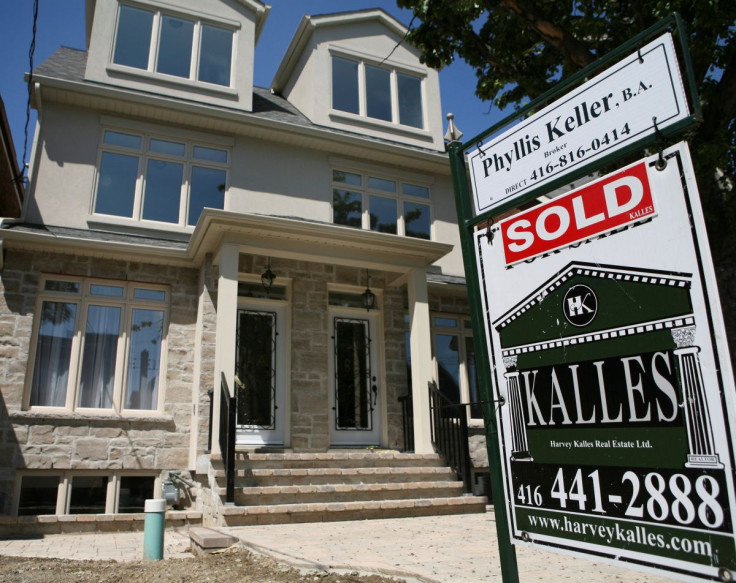Is The Housing Market Heading For Another Crash?

The housing market may be in for another crash, as demand for homes may be waning soon. A recent Gallup survey says that the number of Americans thinking that now is an excellent time to buy a home is at a record low.
"In the early 2000s, as U.S. homeownership reached an all-time high, a record 81% of Americans said it was a good time to buy a house," Jeffrey M. Jones, a Gallup senior editor, said in an article explaining the results of the survey. "As housing prices rose sharply in the mid-2000s, creating a housing "bubble" and leading to an eventual market crash, positive evaluations of the housing market fell to the low 50s."
There were a couple of good reasons behind this sharp fall in the desire of Americans to buy homes then. One of them was rising mortgage rates, making it less affordable for the average household to carry a mortgage to buy a median-priced home. Another reason was soaring home prices, making homes less affordable for the average buyer.
Now, this figure is standing at the record low of 30!
And once again, the reasons are rising mortgages and soaring home prices. In just six months, mortgage rates have almost doubled, while home prices have been rising even during the pandemic, some years in double digits.
"Now that we're officially in a rising interest-rate environment, there is a significant concern that we could be on the cusp of another housing market crash," Dr. Jim Schultz, market expert and on-air personality at tastytrade, told International Business Times. "As rates rise, mortgage payments for prospective buyers rise, which leads many potential homeowners to either downsize their home purchase or leave the housing market entirely. Obviously, this latter option would dampen demand, putting downward pressure on prices, so the concern that we are in a bubble that is about to pop is certainly warranted."
Schultz doesn't see an outright crash in the offing, as mortgage rates aren't that high by historical standards.
"So, yes, housing prices might cool off a bit, given the tightening of the Federal Reserve and the subsequent rise in interest rates, but an all-out housing market crash will take a much bigger catalyst than a simple normalization of mortgage rates back towards historical averages," he added.
Albert Lord, founder and CEO of Lexerd Capital Management, sees a couple of differences between now and then, like a housing shortage and a strong capital formation. He sees higher mortgages and diminished affordability leading to a moderation in price gains, but not imminent collapse.
"Prices will still increase at a low rate of growth compared to last year's growth of 20% due to lack of inventory, need of housing [and] increasing cost of construction, which leads to modest supply increases, and additional regulatory constraints required for land development and housing construction," he told International Business Times.
Erik Wright, owner and CEO of New Horizon Home Buyers in Chattanooga, Tennessee, doesn't think it's a good idea to compare today's housing market environment with that of 2006-08.
"One of the biggest factors to cause the crash in 2008 was poor lending policies which allowed people to buy homes with little or no down payment and at a price point that was more than they could afford," Wright told International Business Times. "Many of these people had no equity in their homes and were one bad financial month from not being able to afford their mortgage payments. In current times, lenders are being much more conservative with qualifying borrowers, and so the people who are buying homes are in a much stronger position than those in 2008."
That isn’t present in today’s market, at least not yet.
Then there's the severe shortage of homes this time around, which will drive prices higher even if the demand levels off, Wright thinks.
"With the current rising interest rates, some of that demand may decrease, but it has a long way to go before leveling things out. If that does happen, the market may begin to cool off, but I expect it to be more of a plateau than a crash," he adds.
Zack Elias, sales manager of brokerage REAL New York, sees rising mortgages making it harder for first-time homebuyers, but he doesn't see a 2008-style crash either.
"I don't foresee another 'crash' like we saw in 2008. I would hope that the government and lenders learned their lesson after that. Rates are on the rise, but they are still at traditionally 'average' to 'below average' historically over the course of the last 40 years," he told International Business Times.
The bottom line is that the housing market may be in for another slowdown, but not an outright crash. That’s the consensus of the housing market experts at this point. But the situation could change if mortgages continue to climb at the same pace.
© Copyright IBTimes 2024. All rights reserved.





















